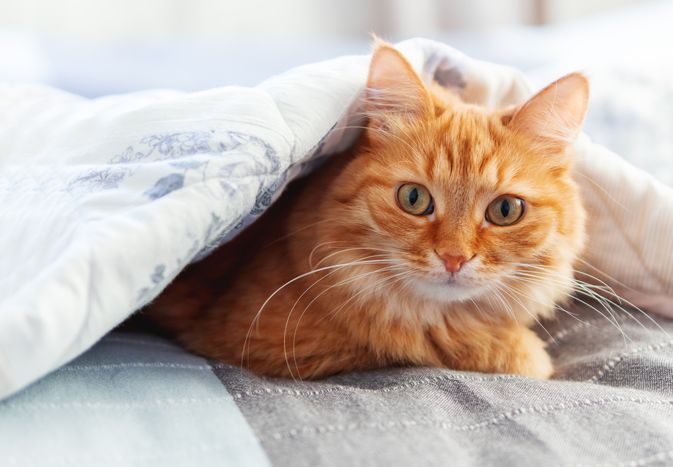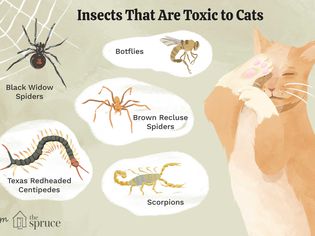
Litter Box Basics Every Cat Owner Should Know
Litter boxes are necessities for all indoor cats. They not only provide contained and pre...
Like humans, cats experience fear, pleasure, hunger, anxiety, frustration, and many other emotions that may affect their behavior. Several common kitty behaviors are seen as undesirable and can affect the quality of life for both owners and their pets. Fortunately, many of these behaviors can be corrected.
Cats tend to be mysterious, so discovering the cause of certain feline behaviors can be a challenge. To further complicate things, there's not necessarily one single reason behind a particular behavior, and every cat has a distinct personality.
You’ve finally fallen asleep when suddenly you hear your cat howling and crying at the top of its lungs outside your bedroom door. This happens all the time with cats, and this behavior may be completely normal for your kitty. After all, cats are nocturnal, like their wild relatives, so they may be more active at night while you're trying to sleep, though it may also be a sign that something's wrong.
Cats scratch to mark their territory. If your cat is scratching objects that you prefer it wouldn't, you can redirect the behavior by providing scratching posts and other toys your kitty can dig its claws into.
Cats are not known to be the voracious chewers that dogs can be. Yet some still manage to do quite a bit of damage with their teeth. Chewing behavior in your cat may be caused by boredom, aggression, a nutritional deficiency, teething in kittens, or having been weaned too young. It might also simply be because your cat is playing or likes the texture or taste of the item.
Cats can have a variety of urinary issues. Infections, inflammation, bladder stones, stress, tumors, and other factors can cause a cat to urinate outside its box, spray, or be unable to urinate. Conflicts between cats or other pets and changes in the house (e.g., construction, family members leaving, new family members arriving) can stress cats and lead to litter box issues as well.
Cats may become aggressive toward other pets and people, and it's a major behavioral problem. The aggression can be caused by stress and anxiety or by a medical problem that causes pain or hormonal changes in a cat.
Chronic licking in cats typically stems from pain or stress and anxiety. While all cats lick themselves, excessive licking may be serious and should be addressed without delay.
A cat that's in pain may lick an area on its body until it's hairless and raw—and it isn’t always in the area that's causing pain. A stressed or anxious cat may lick its belly until it has no fur or obsessively overgroom other parts of its body.
Some behavioral issues stem from a cat's instincts, but it's best to begin by ruling out medical problems with your vet. If you suspect your cat is ill or in pain, seek veterinary care. Discuss supplements, medications, pheromones, special diets, and other things that are designed to help older cats or curb excessive licking.
After that, you can start to address and discourage certain behaviors such as jumping on counters or help your cat overcome whatever issue is the cause.
Providing your cat with something to keep it busy while you sleep may help prevent night howling. You could also provide more exercise during the day so it's less active at night.
Your cat may howl when it wants food, to go outside, or to be petted. The response you give your cat (e.g., giving in to its demand for a treat) will train it to continue to make these vocalizations to get what it wants.
Entice your cat to use a scratching post by sprinkling catnip on it and placing it in front of the items you don’t want it to scratch. Some cats like certain fabrics and materials more than others, so you might need to try scratching posts that offer various textures. If your cat doesn't like its current post, try one made with carpeting, rope, or corrugated cardboard.
Aside from scratching posts, you can use pheromones and nail caps on an ongoing basis. Nail caps are small plastic nail coverings that are glued over your cat’s nails to protect your furniture. Pheromones are available as sprays, wipes, and diffusers to help calm your cat and discourage any scratching behavior that's due to stress or anxiety.
Declawing—which is actually an amputation—is a controversial subject but is also sometimes performed to prevent cats from scratching furniture. This nonreversible surgery should be researched thoroughly and discussed with your vet.
If your cat's chewing is a concern, look to the cause for a solution:
If you spot your cat straining or unable to urinate, it needs immediate veterinary care. Special litter, diets, pheromones, supplements, and medications can all help with urinary behavioral problems in your cat. When medical reasons have been ruled out, then it's oftentimes a behavioral problem that needs to be addressed.
Observe your cat for any triggers that cause it to be aggressive. If you can figure out what the trigger is and get rid of it, this is the easiest way to deal with aggressive behavior.
Quite often, your cat may have to learn to live with the trigger. Again, pheromones, supplements, medications, and special diets may help. You can also give your cat other things to focus its energy on, like exercise-inducing toys. Try other simple solutions, such as setting up dividers between food bowls and litter boxes.

Litter boxes are necessities for all indoor cats. They not only provide contained and pre...

Different cats display different types of behaviors. Some cats are very cuddly and affect...

As you probably already know, cats make a variety of noises. Some breeds, such as Siamese...

If you’ve ever been rudely woken up from a deep and serene sleep thanks to a heavy cat ...

Diabetes is a common disease in cats that can lead to many other health problems. Fortuna...

Cheese is a staple food item in most homes. In fact, it’s so commonplace, some pet owne...

Cats in heat don't usually bleed or have periods the way humans do, but they experien...

Pinworms, also known as threadworms, are a common problem for people and especially ...

It is not uncommon for cats to hunt insects, and even sometimes eat them. Many common ins...
Comments on "How to Solve Behavior Problems in Cats" :